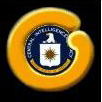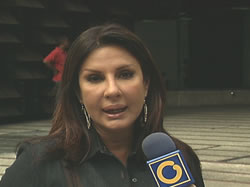|
|
|
|
|
Guillermo Zuloaga |
The mansion involved is property of Guillermo Zuloaga, main shareholder of the private 24 hours TV news channel, Globovision. After convincing Zuloaga’s lawyer to let them enter the residence on the basis of a Search Warrant, issued by the 44th Control Tribunal in Caracas to search the property and the residence, it was discovered that 24 or 26 brand new vehicles were parked there, all Toyotas of different models from the pick up Tundra to the small family car, the Yaris.
|
|
| Dr. Perla Jaimes, Globovision's lead lawyer |
Florez Trossel said that if the documents and keys were not handed over to the INTTT functionaries present to carry out the inspection, tow trucks would be called to impound them in the police containment lot where the inspection would take place. Documents were produced but, according to State TV Channel, VTV, the ownership of the vehicles proved inconclusive. The CICPC then obtained the keys and at around 1am the vehicles were transferred to the police pound. The eleven tow trucks summoned were not required.
As could be expected the rich neighbors came out into the street banging pots and pans, calling the police “thieves” and generally insulting everyone involved in the operation, especially the VTV reporter.
While all this was happening, Guillermo Zuloaga was interviewed on his own channel (Globovision), saying that he was not worried at all, since he was member of Toyoclub, a car dealership for Toyota. The vehicles had been stored at his mansion (you got to have a big mansion to store so many vehicles) for safe keeping as they had been transferred from Valencia, the main Venezuelan city for the motor industry.
However, a number of issues and questions have to be addressed:
- It is doubtful that Zuloaga's private residence in East Caracas is registered as a commercial property. If it is not registered as such, his operation would be illegal.
- The engine size of some of the vehicles was over 3500 cc and vehicle imports of this size (excluding trucks) for 2009 models were banned in Venezuela from January 1, 2009 forward.
- What was the origin or port of entry for these vehicles if they in fact are illegal? They may very well have been smuggled into the country, and if so, probably by land from Colombia. There were no certificates of origin for any of the vehicles. This is where such business deals can really become a problem for the perpetrators in Venezuela.
- The documents inspected in situ by the INTTT revealed that these vehicles had been bought and sold between dealers. Why were they sold among dealers while the public waits for several months to buy any of the models taken into custody?
- The answer is simple. Dealers are selling all vehicles in Venezuela for up to 5 times the official "list price” in an operation which can only be classified as usury.
- The favorite method of the dealerships to jack these prices is to hoard the vehicles, keep the waiting lists going and create artificial shortages so as to blackmail the middle class Venezuelan consumers who have enough financial clout to pay up to US$125,000 for a vehicle which sells for less then US$45,000 in the US.
- As an upstanding businessman, owner of a major TV station and a Beverly Hills type film star mansion in Los Chorros, where many honest, non exploiting Venezuelan middle classes live, we are certain the Mr. Zuloaga intended to sell these vehicles at list price. Ahem!
- It's also noteworthy that Mr. Zuloaga’s fellow share holder in Globovision, Nelson Mezerhane, is also the owner of the Banco Federal and The Federal Insurance Company.
- Now, since we are sure that Mr. Zuloaga, honest businessman that he is, had every intention to sell these vehicles at the lower list price. If he had done so, his partner, Mr. Mezerhane would have made far less money granting bank loans for the vehicles’ purchase and would have had to charge lower insurance premiums to cover the vehicle.
- In effect, it is obvious that there were no vested interests at play here and both businessmen were serving the public interest in fairness and had no intention of indulging in usury practices. Trust them on that and they will no doubt have a bridge to sell you.
|
|
|
| (Left to Right) Nelson Mezerhane and Alberto Federico Ravell, General Director of Globovision |
No-one would ever think of accusing upstanding citizens like Mr. Zuloaga or Mr. Mezerhane of operating a “mafia” style, monopoly scheme in Venezuela which, according to them, is a castro-communist-military dictatorship. At least, that is the editorial line taken by their 24 hour news channel.
Nevertheless, things have changed in Venezuela. Just ten years ago no-one in authority would have dared question a powerful business man such as Mr. Zuloaga and no judge would have signed a warrant to search his property in the sovereign Republic of East Caracas.
The media show, mounted last night by Globovision for hours – until past 1am - is typical of this channel’s inimitable style, accusing the government of everything from destruction of private property rights to endangering democracy.
This problem for Mr. Zuloaga comes on the back of CONATEL (Venezuelan FCC) opening three cases against Globvision for breaking the Law of Social Responsibility in Radio and Television (Ley Resorte). One for broadcasting election results before the Electoral Council had announced election results (illegal in Venezuela) during the November 23rd 2008 regional elections. Another for allowing an opposition journalist to say on live TV that President Chávez could be hung upside down like Mussolini and the latest faux pas of prematurely reporting the earthquake of May 4th in terms that generated excessive fear in the population.
If one of these charges is proven, Globvision could be closed for 72 hours and if a second charge is proven, the channel could have its broadcast license suspended. It would then be limited to cable just like its conspirator-in-arms- RCTV.
Maybe Zuloaga and his fellow directors want this to happen. The removal or non renewal of the open broadcast license would be a great media show against the government with international condemnation from Human Rights watch and the Interamerican Press Association, once against proving that President Chavez is a “tyrant”, "anti-free-speech", a “dictator” and a ”communist” a la Fidel Castro.
Left to broadcast their poison on cable, Globovision would be free from the restrictions of the Ley RESORTE and it could invariably do whatever it wanted. Cable TV is still a preserve of the targeted middle classes in Venezuela although it is also spreading its junk-programming little by little to classes C and D. Oh, the joys of US values and transculturization of the ignorant Venezuelan masses, thinks DirecTV, Supercable and Intercable!
Thus, Globovision just keeps on digging.
Let’s wait for the outcome of CONATEL’S investigations but in the meantime the Venezuelan government should take preemptive action to investigate and analyze Colombia’s broadcast laws.
In Colombia content is also controlled on cable by the Colombian FCC and such measures could be adopted by CONATEL and the Venezuelan National Assembly. This would remove the safe haven on cable in Venezuela for this channel which has become a public health hazard. Gaining control of cable TV content, Colombia-style, would allow our children grow up in peace instead of being wracked with the hysteria created by Globovision and the ratatat programming of junk values on A&E, Fox and the ubiquitous Mexican channels.
Update inserted at the author's request:
| However, in a further legal clarification and according to journalist Ernesto Villegas writing today (May 21st) in the weekly journal Quinto Día, if Globovision is sanctioned and has its broadcast license revoked under Article 172 of the Telecommunications Law, it will not be able to broadcast anywhere is Venezuela for five years, not even on cable. In addition, the directors of the channel would not be permitted to run another TV channel for the same period. Only if the broadcast license is not renewed at the time of its expiration would Globovision be able to reappear as a cable channel. Perhaps the directors of Globovision should reassess their strategy in the face of this terminal threat. On the other hand, they could always try and obtain a concession in Colombia since Globovision is closely allied with Colombian channels RCN and Caracol, which are both rabidly anti-Chavez and unquestioningly support the horrors of the Uribe regime. What more could Mr. Zuloaga wish for? |
I wonder if Mr. Zuloaga went to the police pound this morning to claim back his vehicles? I doubt this very much and he may very well be planning a long “business trip” to Miami, Panama or Peru to join other fugitives from justice. Meanwhile, Globovision continues to dig its own grave deeper every day.
Further information on the Globovision saga see Globovision: The Loose Cannon of Venezuelan Media

